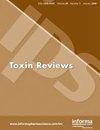海桐中有效抑制剂β-豆甾醇的研究。叶片抗蛇毒磷脂酶A2蛋白的体外及分子动力学行为研究
IF 2.4
4区 医学
Q2 TOXICOLOGY
引用次数: 2
摘要
摘要从海桐叶提取物中分离、鉴定并鉴定了对毒蛇(Daboia russelii)和眼镜蛇(Naja Naja)毒液中丰富的PLA2蛋白具有抗蛇毒活性的β-Stigmasterol。通过RP-HPLC分析检查化合物纯度,通过FTIR和NMR分析阐明结构,然后进行体外和计算机研究。通过分子动力学模拟评估对接配合物的结构稳定性,并通过MM-PBSA分析计算结合自由能。体外分析表明,分离的化合物β-SS对D.russelii PLA2有效(IC50 40.903 ± 0.479 μg/mL)比中华蟾蜍毒液PLA2(42.340 ± 0.11 μg/mL)。计算机方法有助于得出结论,β-SS-PLA2 D.russelii复合物在整个动力学模拟时间段内表现出稳定的构象,灵活性降低,具有高亲和力对接能−10.60 kcal/mol比β-SS-PLA2 N.naja复合物高,其观察到的对接能量为−10.39 kcal/mol。本文章由计算机程序翻译,如有差异,请以英文原文为准。
Exploring the potent inhibitor β-stigmasterol from Pittosporum dasycaulon Miq. leaves against snake venom phospholipase A2 protein through in vitro and molecular dynamics behavior approach
Abstract β-Stigmasterol, responsible for antivenom activity against abundant PLA2 protein of Viper (Daboia russelii) and Cobra (Naja naja) venom, was identified, characterized, and isolated from Pittosporum dasycaulon leaves extract. The compound purity was checked by RP-HPLC analysis, and structure was elucidated by FTIR and NMR analysis, followed by in-vitro as well as in-silico studies. The structural stability of the docked complexes was evaluated by molecular dynamic simulation, and the binding free energies were calculated by MM-PBSA analysis. The in-vitro analysis revealed that the isolated compound β-SS is effective against D. russelii PLA2 (IC50 40.903 ± 0.479 μg/mL) than N. naja venom PLA2 (42.340 ± 0.11 μg/mL). The in-silico approaches helps to conclude that the β-SS-PLA2 D. russelii complex showed a stable conformation with a reduced degree of flexibility throughout the dynamics simulation time period with high-affinity docking energy −10.60 kcal/mol than β-SS-PLA2 N. naja complex, which observed docking energy of −10.39 kcal/mol.
求助全文
通过发布文献求助,成功后即可免费获取论文全文。
去求助
来源期刊

Toxin Reviews
医学-毒理学
CiteScore
6.80
自引率
0.00%
发文量
36
审稿时长
>12 weeks
期刊介绍:
Toxin Reviews provides an international forum for publishing state-of-the-art reviews and guest-edited single topic special issues covering the multidisciplinary research in the area of toxins derived from animals, plants and microorganisms. Our aim is to publish reviews that are of broad interest and importance to the toxinology as well as other life science communities. Toxin Reviews aims to encourage scientists to highlight the contribution of toxins as research tools in deciphering molecular and cellular mechanisms, and as prototypes of therapeutic agents. Reviews should emphasize the role of toxins in enhancing our fundamental understanding of life sciences, protein chemistry, structural biology, pharmacology, clinical toxinology and evolution. Prominence will be given to reviews that propose new ideas or approaches and further the knowledge of toxinology.
 求助内容:
求助内容: 应助结果提醒方式:
应助结果提醒方式:


